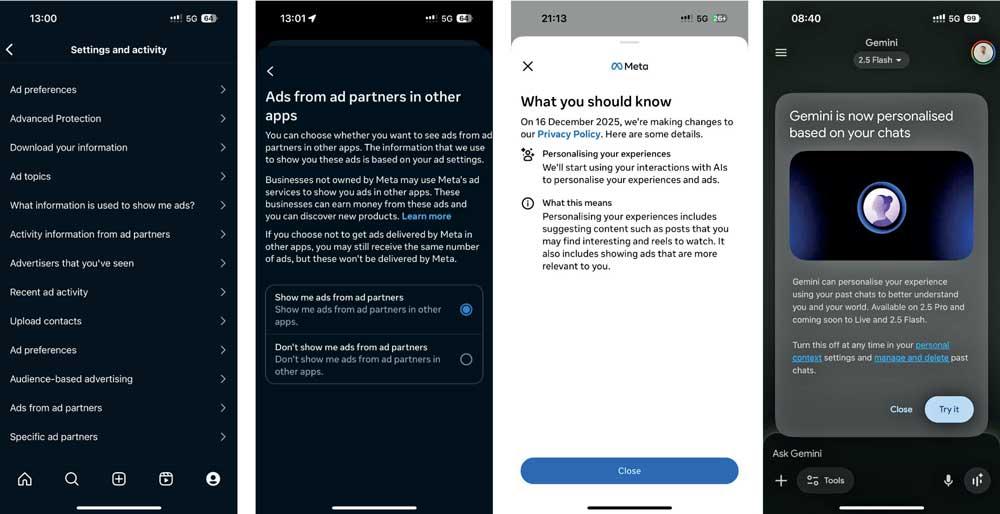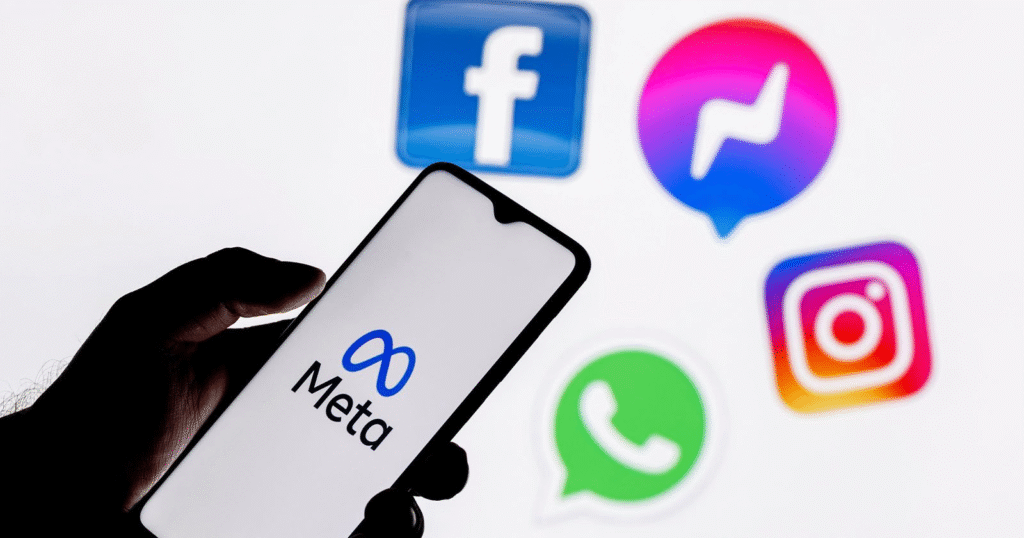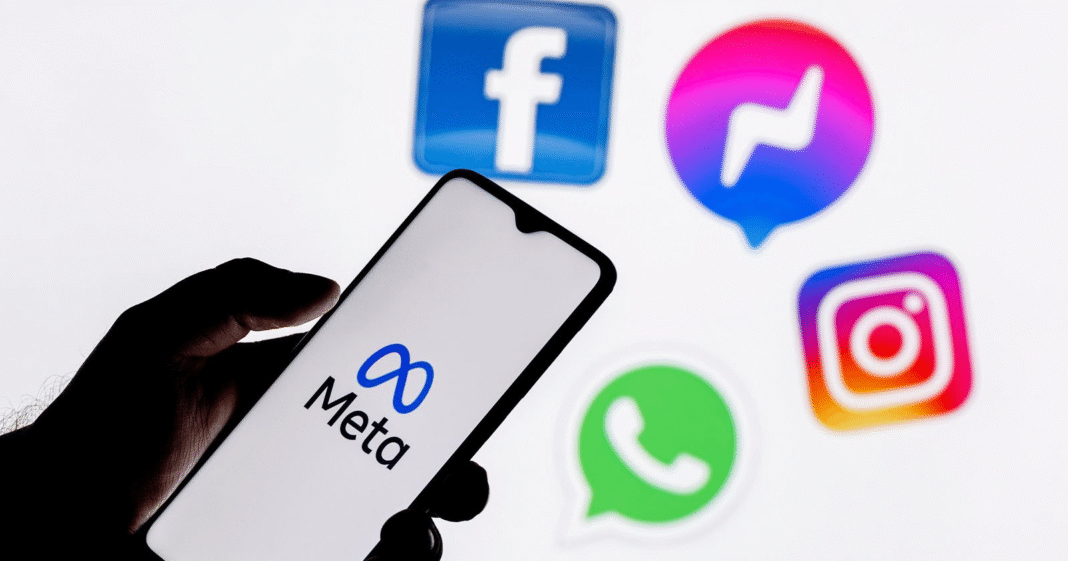
- Both Meta and Google say users can manage or delete chat data, but privacy experts warn these options are often buried deep in settings and not easy for everyday users to find or understand
- With over 1 billion monthly users worldwide, Meta’s assistant has become a major part of daily digital life
- Meta isn’t alone in this shift. Google’s Gemini assistant has also begun using chat history to personalise user experiences
- Meta’s digital assistant is also being rolled out on WhatsApp, where many Sri Lankans spend much of their online time
- Before sharing any confidential or sensitive information with Meta’s assistant, Gemini, or any other AI assistant or agent, users are strongly advised to read each platform’s privacy and data-sharing policies
By Prasad Perera (Exploring Tech, Media and Online Safety)
How many of you have already seen that Meta AI Agent (purple-blue circle) appear on Facebook, Instagram, or WhatsApp?
Meta AI is the company’s new digital assistant, now quietly becoming part of your daily online life. Starting December 16, 2025, Meta will begin using your interactions with this assistant to shape what you see on its platforms. The company says this includes personalising your Facebook and Instagram feeds and showing adverts that better match your interests.
What’s changing

According to Meta, conversations or questions you ask this assistant, whether typed or spoken, will now help determine the kind of posts, reels, and adverts you’re shown. For example, if you ask Meta’s assistant about gym workout plans, you may later see ads for gyms and supplements, gym-related posts from friends, or suggestions for workout routines and fitness groups to join. Meta claims the update will make its apps more relevant and useful. The company began sending notifications about the change on October 7, 2025, giving users advance notice before the Privacy Policy update takes effect on December 16, 2025.
With over 1 billion monthly users worldwide, Meta’s assistant has become a major part of daily digital life. The company’s motivation is clear: it earned $46.5 billion from advertising in one quarter, a 21% jump from the year before, showing just how valuable your data has become.
Meta’s assistant on WhatsApp
Meta’s digital assistant is also being rolled out on WhatsApp, where many Sri Lankans spend much of their online time. While one-to-one WhatsApp chats remain end-to-end encrypted, ensuring Meta cannot read personal messages between users, this protection does not apply to conversations with Meta’s assistant. But the real question is, can we truly trust that the so-called “smart assistant” isn’t quietly listening or learning from those chats?
Messages sent to or received from Meta’s assistant can be processed and analysed by Meta to improve services and personalise recommendations across its apps. However, there’s an important safeguard: if you haven’t added your WhatsApp account to Meta’s Accounts Centre, your WhatsApp interactions with Meta’s assistant will not be used to personalise experiences across Facebook and Instagram.
This means keeping your WhatsApp separate from your other Meta accounts gives you more privacy control for now.
“Meta and Google’s digital assistants are learning from your chats, and that data may decide what adverts you see next. Here’s what Sri Lankan users should know and how to protect their privacy.”

Gemini and others doing the same
Meta isn’t alone in this shift. Google’s Gemini assistant has also begun using chat history to personalise user experiences.
Google notes, “Gemini can personalise your experience using your past chats to better understand you and your world.” Users can disable this in their personal-context settings or delete past conversations.
This shows that automated personalisation is becoming an industry trend, making it crucial for users to understand how their data is collected, stored, and reused.
Before sharing any confidential or sensitive information with Meta’s assistant, Gemini, or any other AI assistant or agent, users are strongly advised to read each platform’s privacy and data-sharing policies. Even if these tools seem private, the information you share could be analysed to improve these systems or influence what content and adverts you see later.
Privacy questions for Sri Lankan users
These changes raise important privacy and transparency questions. In a country where Facebook, WhatsApp, Instagram and Google services dominate communication and business, many users remain unaware of how much of their personal data fuels targeted advertising.
Key questions now being asked include:
Will chats with Meta’s assistant or Gemini be stored, and for how long?
Can users truly opt out of personalisation?
What happens to sensitive topics discussed with these assistants, such as health, relationships, politics, or religion?
Meta has stated that when people discuss sensitive topics with Meta AI, including religious views, sexual orientation, political views, health, racial or ethnic origin, philosophical beliefs, or trade union membership, these topics will not be used to show them adverts. However, this doesn’t mean the conversations aren’t stored or analysed for other purposes.
Both Meta and Google say users can manage or delete chat data, but privacy experts warn these options are often buried deep in settings and not easy for everyday users to find or understand.
The Bigger Picture
As Meta and Google expand their digital assistant (AI) ecosystems, Sri Lankan users, like millions worldwide, face a growing need to understand how their words, questions, emotions and interactions are being recorded, analysed, and used to target adverts back at them.
Every query to Meta’s assistant or Gemini helps these systems learn more about your habits, interests, and behaviour, shaping what products, opinions, or stories appear on your feed next.
The friendly purple-blue circle on Facebook or the glowing Gemini logo on your phone may look helpful, but they also remind us of one truth: in the age of automated assistants, every chat can become marketing data, and it’s up to us to decide how much of ourselves we want to share. At the end of the day, Sri Lankans need to decide how much of their online life and activities they are willing to share and with whom.




